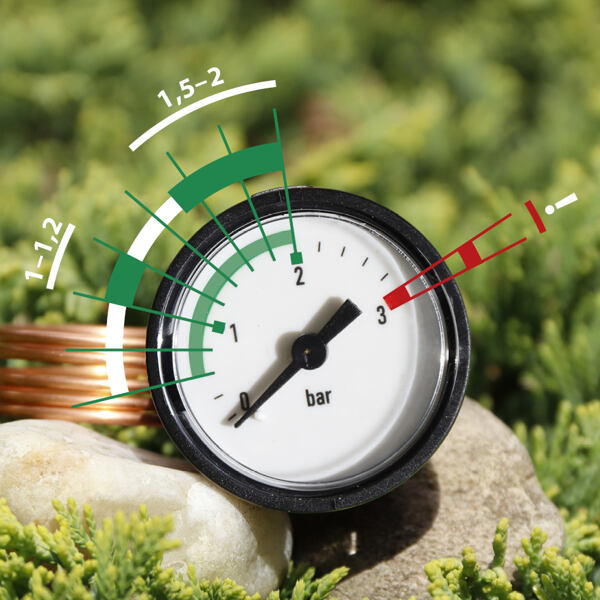Is the water pressure in the boiler too high?
Boiler pressure is the balance between water and air in a central heating system.
Too high pressure of one or the other medium can cause big problems with your boiler and the entire heating system.
Boiler pressure can fluctuate for a variety of reasons and many systems have pressure problems at certain points. If you feel that the pressure in the boiler is too high, this guide will help you explain what the correct pressure is and how you can reduce it yourself.
What is the correct boiler pressure?
- If you do not know where to find the pressure in your boiler, it is usually indicated on the built-in pressure gauge , which should show a value of around 1-1.2 bar , if the heating is not on or if you are not currently using hot water.
- When you turn on the heating , the pressure in the boiler will increase and it should move between 1.5-2 bars . Usually most boilers will highlight this area in green on your pressure gauge which is displayed on the front of the control panel. If the needle of the pressure gauge moves in this part, the system is set correctly.
- If the pressure in the boiler is low, usually below one bar, it may be a leak in the heating system or it is a sign that the radiators need to be vented or water needs to be left in the boiler and heating system.


What happens when the boiler pressure is too high?
If your boiler's pressure gauge starts to exceed 3.0 bar, this can cause your heating system to fail or damage your gas boiler, which could be expensive.
A clear indicator that the pressure in your heating system is too high is the fact that water is dripping or leaking from the safety valve .
The safety valve is usually located directly in the boiler and is marked with the opening pressure (for heating 3 bars, for hot water heating 6-10 bars).
What are the causes of high pressure in the boiler and how to reduce it?
- Your system has been flooded with water. This is the most common cause of high pressure that will show up when you re-pressurize the system when you turn the valves on the fill loop. If you have a radiator vent wrench, it won't cost you anything and will easily restore balance and reduce boiler pressure.
To relieve pressure, take a radiator bleeder wrench and insert it into the radiator valve. Then turn it counterclockwise to release air and then some water from the system; make sure you have something to catch the water. Drain some water and check the boiler pressure gauge to see if the pressure has been reduced to 1-1.2 bar.
- You may have a faulty expansion tank. Your combi boiler has an expansion tank inside which helps maintain a constant pressure and prevents rapid pressure changes in the boiler.
If you don't have enough air in the expansion tank, the pressure can be too high, which can result in water coming out of the relief valve. Although you shouldn't handle it yourself, you can check out our article How to pressurize an expansion tank or call a trained service technician.
- Your fill loop valve was not closed properly. In such a case, it could cause an increase in the pressure in the boiler, as more and more water enters the system. Check that both fill loop valves are off and closed clockwise.
- Safety valve. The job of your relief valve is to release the water when the pressure in the boiler starts to rise and becomes too high. If you find that water is still flowing through the safety valve, you must call a technician and have the valve checked and replaced.
- And finally, old age. Age can play a big role in problems with your boiler . If you feel that your boiler has more problems than you thought, be sure to have it checked by a trained service technician. If you need to replace your boiler, take a look atour range of Hermann boilers .






















































